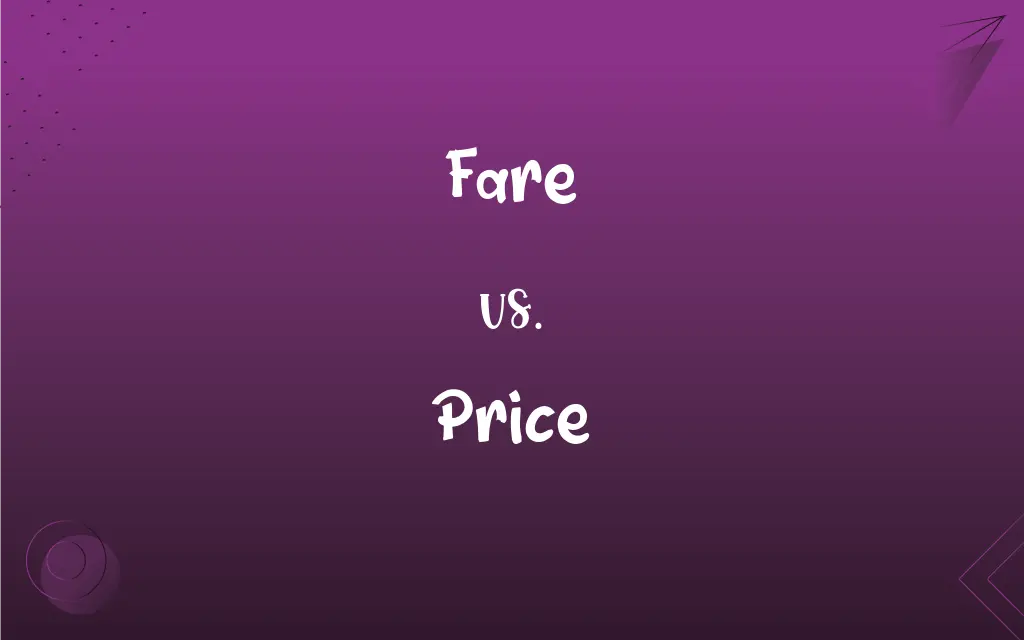Fare vs. Price: What's the Difference?
Edited by Aimie Carlson || By Harlon Moss || Published on December 1, 2023
Fare is the fee paid for transportation (like a bus ticket or taxi ride), while price is the cost of any good or service.

Key Differences
Fare specifically refers to the fee paid for transportation, such as a bus ticket, taxi fare, or train fare. It's often used in the context of public or shared transportation. Price, on the other hand, is a broader term that applies to the cost of any item or service, including but not limited to transportation.
The word fare is limited to the context of travel and transport services. It implies a set fee for a journey or trip. Price, however, can be used in a variety of contexts, from purchasing groceries to buying a house, indicating the monetary value of an item or service.
Fare is commonly used in the transportation industry, encompassing fees for buses, trains, planes, taxis, and other modes of transport. Price is a more universally used term across all industries, indicating the cost of goods and services in general.
Fares often have a structured system, with rates possibly varying based on distance, zone, or type of service (e.g., first-class, economy). Prices can fluctuate based on market demand, quality, brand, and other economic factors.
Fare comes from the Old English 'fær,' meaning journey or passage. Price derives from Latin 'pretium,' meaning value or worth, indicating its broader application in indicating the value of goods and services.
ADVERTISEMENT
Comparison Chart
Definition
Fee for transport services
Cost of goods or services
Context
Limited to transportation
Applies to all goods and services
Variability
Structured, often based on distance or service type
Fluctuates based on market factors
Industry Use
Transportation industry
All industries
Etymological Origin
From Old English 'fær' (journey)
From Latin 'pretium' (value)
ADVERTISEMENT
Fare and Price Definitions
Fare
Fare indicates the price for traveling from one place to another.
The airline offered a discounted fare for early bookings.
Price
Price indicates the amount of money required for a purchase.
The price of smartphones varies widely.
Fare
Fare is the fee for public transportation.
The bus fare increased this year.
Price
Price refers to the monetary value of an item.
They negotiated the price of the car.
Fare
Fare is the cost of a ticket on a train, bus, or other transport.
The train fare was surprisingly affordable.
Price
Price is what a buyer pays for a product.
The price tag showed it was out of my budget.
Fare
Fare is a set fee for a specific travel service.
The ferry fare includes access to onboard amenities.
Price
Price is the cost of goods or services.
The price of milk has gone up recently.
Fare
Fare refers to the charge for a journey on a vehicle.
She paid the taxi fare using her credit card.
Price
Price is the financial cost of acquiring something.
They compared the prices of different insurance plans.
Fare
To get along
How are you faring with your project?.
Price
The amount as of money or goods, asked for or given in exchange for something else.
Price
The cost at which something is obtained
Believes that the price of success is hard work.
FAQs
How is price defined?
Price is the monetary value or cost of any good or service.
Can price be applied to services?
Yes, price applies to both goods and services.
What does fare mean?
Fare is the fee paid for a journey on public or shared transportation.
Does fare vary by distance?
Often, fare varies depending on the distance or travel zones.
What factors affect price?
Price can be influenced by demand, quality, brand, and market conditions.
What role does branding play in price?
Branding can significantly influence the price, often indicating higher costs for well-known brands.
Is fare structured differently for different transport modes?
Yes, fares differ for buses, trains, planes, and other transportation modes.
Is fare used only for transportation?
Yes, fare specifically refers to transportation costs.
How is the price of a product determined?
A product’s price is determined by costs, market demand, and competitive pricing.
Can price fluctuate over time?
Yes, prices can change based on economic factors and demand.
Does price always involve money?
Yes, price involves the exchange of money for goods or services.
Are fares regulated by government bodies?
In many cases, fares for public transport are regulated or overseen by government agencies.
Do fares include additional charges?
Fares can include additional charges like service fees or booking fees.
Can price be subjective?
The perceived value of a product can make its price subjective to consumers.
Is fare applicable to private vehicles?
Typically, fare is used for public or commercial transport, not private vehicles.
Can fare be negotiated?
Fares are usually fixed, especially in public transport systems.
Does price always reflect quality?
Not always, as the price can be influenced by various factors other than quality.
How do retailers decide on a price?
Retailers consider cost, competition, and customer willingness to pay when setting prices.
Are fare and price synonyms?
No, they are not synonyms and have different specific contexts of use.
Are there discounts on fares?
Yes, discounts on fares are often available for certain groups like students or seniors.
About Author
Written by
Harlon MossHarlon is a seasoned quality moderator and accomplished content writer for Difference Wiki. An alumnus of the prestigious University of California, he earned his degree in Computer Science. Leveraging his academic background, Harlon brings a meticulous and informed perspective to his work, ensuring content accuracy and excellence.
Edited by
Aimie CarlsonAimie Carlson, holding a master's degree in English literature, is a fervent English language enthusiast. She lends her writing talents to Difference Wiki, a prominent website that specializes in comparisons, offering readers insightful analyses that both captivate and inform.






































































